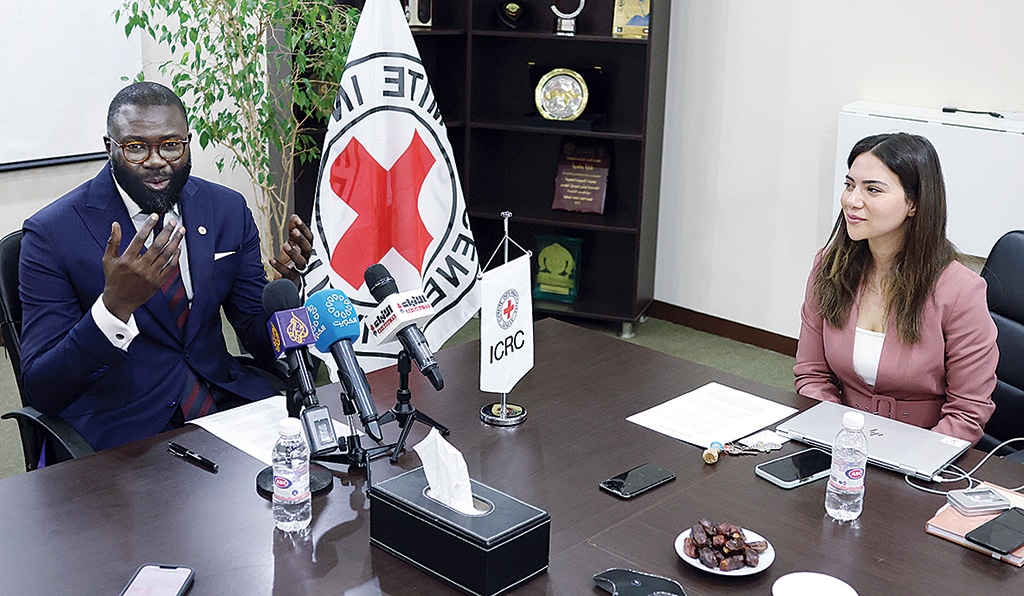By Ghadeer Ghloum
KUWAIT: The International Committee of the Red Cross (ICRC) held a meeting on Monday to mark its 160th anniversary 'serving humanity', in the presence of Regional Head of Delegation for GCC Countries Mamadou Sow. During the meeting, Sow linked ICRC not only to human aid, but also to Islamic values. "The story of ICRC is about men and women who are victims of war around the world. It is also the story of men and women whose work is harnessed for the idea that is taught by Prophet Muhammad (PBUH) and his companions - that men, women and children should be spared in times of war. This idea was later embraced in the Geneva convention and it's the essence of what we do today in so many countries," he said.
Sow also said ICRC and Kuwait are joined by an outstanding relationship that has existed since the liberation of Kuwait, especially in the last 30 years. "Today our strategic partnership is a source of strength for us, particularly in the leading efforts to alleviate suffering in places where we are working around the world, from Bangladesh to Syria to Yemen to Lebanon, not to mention Afghanistan and many other places. We have together established concrete humanitarian action to enable the needed assistance to victims around the world." he said.
Although Sow has been in Kuwait only for seven months, he said he has already learned a lot from Kuwaitis. "I have learned that true wealth is not really what you accumulate, but also what you share with the community and people around the world. I believe this is a true investment - it is an investment in hope and humanity. So, I would love to express my appreciation to the people and the government (of Kuwait)," he said.
However, according to Sow, ICRC's work is not done yet. Today, there are many conflicts around the world. For instance, in Yemen, the population is around 30 million people, but 24 million of them are in need of humanitarian aid. Up to 17 or 19 million people face food insecurity, 17 million lack access to clean water and 3 million have been displaced. ICRC's action is absolutely needed in Yemen, where ICRC works on helping Yemenis with all their needs.
Sow said ICRC is also present in Gaza and the West Bank to continue supporting Palestinians, despite their suffering is no longer in the news like before. Moreover, 15 million Syrians need humanitarian assistance, because on top of 12 years of war, a massive earthquake affected them too, so ICRC is there to help and alleviate their suffering. Speaking about the Syrians' sufferings after the earthquake, Sow repeated his gratitude and appreciation to Kuwaitis who donated and supported the Syrians after the earthquake struck.
Sow also mentioned Afghanistan, saying Afghanistan's infrastructure has collapsed. Thus, ICRC has taken it upon itself to take care of more than 30 hospitals. "These are only a few examples of crises that the world is facing. There are also situations in different parts in Africa regarding food insecurity, and the list goes on, especially since the guns are not silent in Africa," he said. Sow assured ICRC, as it has been doing in the last 160 years, will continue standing on the side of people who are suffering around the world.
Additionally, Sow highlighted the importance of the relationship between ICRC with and Kuwait and GCC countries. "ICRC's office in Kuwait is the regional office. We have also opened offices in Qatar, Saudi Arabia, Oman and the United Arab Emirates, and we will visit Bahrain. So, we are present here in the GCC because we think that the GCC is a very important place for ICRC, not only to do humanitarian action, but also to partner with many parties and governments to support people in need globally," he said.
Sow added in terms of action in GCC countries, ICRC does a lot of teaching on international humanitarian law, because people have to recognize this law in order to respect it. "If it is not respected, it will not save lives. But people will not respect it if it is not known. That is why you find us in different places like the military academy, at diplomatic institutes, at universities, to make sure that humanitarian laws are known," he said.
Sow expressed his gratitude to people of Kuwait and the government, and highlighted the humanitarian leadership of HH the Amir Sheikh Nawaf Al-Ahmad Al-Jaber Al-Sabah for positioning Kuwait as a strong supporter of humanitarian activities around the world.











